from NOLA.com –
In an old New Orleans church, Elysian Bar finds new way to carry on
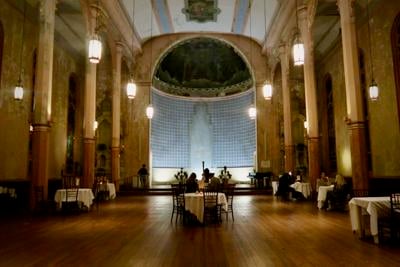
Staff photo by Ian McNulty
We knew what we’d signed up for at the Elysian Bar. After all, I selected “church” for the seating option on the online reservation form. It brought much more than I’d imagined.
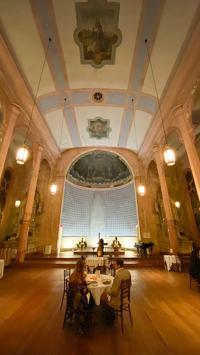
Staff photo by David Grunfeld
From our table we took in the setting, this soaring old church with 40-watt ambiance, saints in the stained glass and angels in the rounded ceiling high above.
We weren’t expecting music, but this vaulted gothic nave resonated with the sounds of a harpist performing solo near where the altar once stood.
We settled in. We lowered our shoulders and unclenched. For the span of the meal we were somewhere else, a place reshaped by these times but simultaneously a respite from them.
Plus, there was whipped ricotta to pile over the sourdough flatbread and a wonderful treatment of raw Louisiana oysters to slurp from the shell.

Staff photo by Ian McNulty
The Elysian Bar is the restaurant within the Hotel Peter & Paul in Faubourg Marigny. The hotel occupies the former Sts. Peter and Paul Catholic Church, a campus of brown brick buildings lining half a block of Burgundy Street.
Normally, the Elysian Bar is in the old rectory, wending across a progression of parlors and cloistered spaces, leading to a sumptuous bar in its own chamber of the complex.
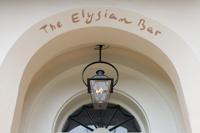
Photo by Brett Duke NOLA.com | The Times-Picayune
With COVID-19 though, cloisters and chambers are out, open spaces are key and the Elysian Bar transformed itself to correspond.
At first, it used a tented space outside. As winter approached, though, a new plan took shape.

Photo by Brett Duke NOLA.com | The Times-Picayune
The Elysian Bar, a sister restaurant to Bacchanal, is operated as a separate business within the hotel. Normally, the hotel uses the church as an events space. Events are few these days. Restaurants are under a dire imperative to adapt.
So, in a spirit of cooperation between interdependent businesses, the church is now the Elysian Bar’s temporary home, its socially distanced dining room. The restaurant also still uses its open-air courtyard, between the church and the rectory.

Photo by Cheryl Gerber
The menu has the familiar signature of chef Alex Harrell, whose modern way with Southern flavors we got to know at his prior restaurant Angeline, and at Sylvain before that.
A salad of blood orange and roasted beets was a bright-and-earthy palate opener. The garlic shrimp wore a toasty, buttery crumble imbued with bottarga, a cured roe for a subtle salty, briny bite.

Staff photo by Ian McNulty
We ordered raw oysters, the cultivated kind from Caminada Bay via the Louisiana Oyster Co. I think oysters like this need only a squeeze of lemon, if that. But the Elysian Bar did them one better, augmenting the oysters’ natural luxuriance with thin slices of kumquat and a measured gush of chile-spiked citrus.
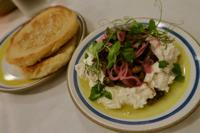
Staff photo by Ian McNulty
The ricotta was a creamy cloud strung with pickled mushrooms and shallots to swipe thickly over flatbread, which had a texture somewhere between airy pancake and buttery biscuit.

Staff photo by Ian McNulty
The steak, a Wagyu chuck filet (from Raines Farm near Monroe, Louisiana), was sliced and sluiced with a garlicky anchovy butter that smacked with umami.
Dessert was dark chocolate torte topped with cream made dark from molasses and strewn with pecans.

Staff photo by Ian McNulty
Throughout it all, Cassie Watson Francillon played a gold painted harp and beamed a smile behind it as soft applause rose after each song.
The music schedule changes weekly — piano one night, acoustic guitar the next. The gigs help local musicians who have few opportunities to work now, and they contribute something bigger to the experience here.
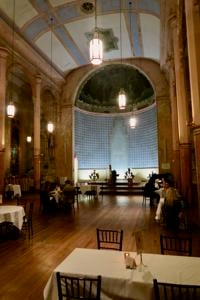
Staff photo by Ian McNulty
Francillon’s harp animated a space that, despite its grace and because of its scale, could feel daunting on a slow night. There were three other tables seated on the weeknight when we visited; Francillon made it feel like we were in precisely the right place and time, one we’ll remember when we tell stories about the pandemic years from now.
Deconsecrated and left idle for more than a decade, the church retains its aura. It carries a patina not just of age but of time, with the structure’s original purpose written into its contours.
Spending time here made me think about the role churches like this had in neighborhood life, the anchoring effect of an institution with open doors where people convene.
It made me think of how we value restaurants for doing something similar, and how in this crisis — through our forced distance and loss and loneliness — that secular comparison doesn’t seem like such a stretch.

Staff photo by Ian McNulty
I realized all our decisions at the table that night — the cocktails to start, the pacing of courses, the dessert and something to sip after — were an attempt to stretch our visit together a little longer, to extend this time carved out from our own turmoil just a bit more.
When I spoke to Harrell days afterward, I learned a similar perspective goes into the restaurant’s work too.
“If you allow the everyday stuff to beat you down, it will,” Harrell said.
“But when I step into that kitchen and I’m with my people, that’s a chance for me to recharge and forget about everything else for a while and just be there, and enjoy that time,” he said. “We have to find a way to do what we do.”
Amen to that.
2317 Burgundy St., (504) 356-6768
Dinner Wed.-Mon. 5-10 p.m., brunch Fri., Sat., Sun., 11 a.m.-3 p.m.
This column is part of an ongoing look at how New Orleans restaurants are contending with the pandemic. See more

